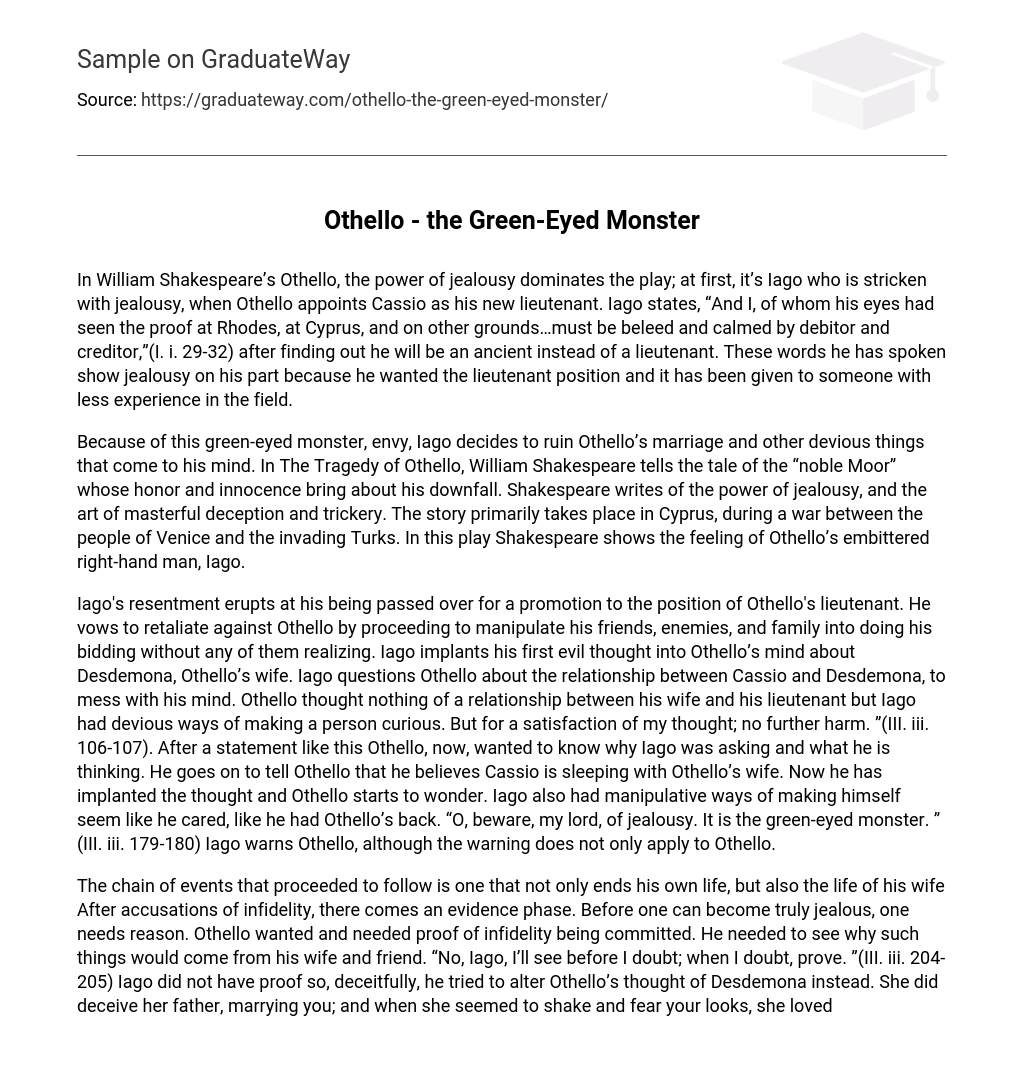The power of jealousy in William Shakespeare’s Othello is evident. Initially, it is Iago who becomes jealous when Othello chooses Cassio as his new lieutenant. Iago expresses his jealousy by stating, “And I, of whom his eyes had seen the proof at Rhodes, at Cyprus, and on other grounds…must be beleed and calmed by debitor and creditor,” (I. i. 29-32). These words clearly showcase Iago’s jealousy as he desired the lieutenant position for himself, rather than it being given to someone less experienced.
Through the powerful emotion of envy, Iago is driven to destroy Othello’s marriage and commit other malicious acts. William Shakespeare’s play, The Tragedy of Othello, depicts the downfall of the noble Moor due to his honor and innocence. Within the story, Shakespeare portrays the destructive force of jealousy as well as the skillful manipulation and deceit. The events primarily unfold in Cyprus amidst the ongoing conflict between Venice and the invading Turks. Throughout the play, Shakespeare delves into the embittered thoughts of Othello’s loyal companion, Iago.
Iago, who is resentful for not being promoted to become Othello’s lieutenant, retaliates by secretly manipulating Othello’s friends, enemies, and family. Through subtle manipulation, Iago plants doubt in Othello’s mind about his wife Desdemona and her relationship with Cassio. Despite initially ignoring these doubts, Othello becomes curious due to Iago’s tactics. Furthermore, Iago shares his suspicions of an affair between Cassio and Desdemona with Othello, intensifying his uncertainties.
Additionally, Iago pretends to be concerned for Othello’s well-being and warns him about the dangers of jealousy. This warning applies not only to Othello but also serves as a reminder for anyone susceptible to falling prey to jealousy.
Othello’s life and that of his wife took a tragic turn due to a series of events. The allegations of infidelity led to the presentation of evidence, as one cannot be truly jealous without reason. Othello wanted proof regarding his wife’s faithlessness and sought to understand why such actions could come from someone he considered both his wife and friend. “No, Iago, I’ll see before I doubt; when I doubt, prove.” (III. iii. 204-205) Since Iago lacked evidence, he deceitfully attempted to manipulate Othello’s perception of Desdemona instead. “She did deceive her father, marrying you; and when she seemed to shake and fear your looks, she loved them most.” (III. iii. 221-223) This further intensified Othello’s suspicions and drove him to seek confirmation about his wife’s fidelity or lack thereof. While still maintaining trust in her, he planned on observing her for signs. “Set on thy wife to observe.” (III. iii 257) If Othello wasn’t already jealous before, now he certainly is questioning their marriage as well as the potential emotional harm while reconsidering their union.
His jealousy is causing this thought to grow in his mind, where it previously did not exist. “She’s gone. I am abused, and my only relief is to hate her. Oh, the curse of marriage.” (III. iii. 284-285) Shakespeare has crafted Iago’s character to be deceitful, as he is able to manipulate Othello into having negative thoughts about the woman he loves. Furthermore, he introduces jealousy into a newly formed marriage. Jealousy transforms into a monstrous entity when one discovers evidence of infidelity or is led to believe so.
Through his deceit, Iago managed to acquire a gift given by Othello to his wife. He cunningly exploited this object, fueling Othello’s jealousy to the point of overflowing. The gift in question was a handkerchief bestowed upon Desdemona. Observing Cassio with this handkerchief, Othello became consumed with anger. His jealousy has now transformed into an intense green-eyed monster, driving him to madness. In his fury, he proclaimed, “Ay, let her rot and perish, and be damned tonight, for she shall not live” (IV. i. 170-171). Othello has succumbed to his jealousy and the deceptive accusations made by Iago, leading him into the realm of an irrational love triangle.
He desired the death of his lieutenant and his wife, and he continued to be fueled by anger and suspicion until he ultimately succeeded in murdering his wife. Despite her denial of any affair, it was already too late as Iago had successfully convinced him. “oh, perjured woman! Thou dost stone my heart, and makes me call what I intend to do.” (V. ii. 66-67) Othello’s jealousy had transformed into a monstrous force, which was caused by Iago’s own malevolence. To summarize, although there were various forces at play in this drama, it was ultimately jealousy that reigned supreme.
If people did not experience such emotions, they would not have as many motivations to commit murder. Othello became entangled in Iago’s deceptive falsehoods and narratives, enabling Iago to manipulate his thoughts and stoke his envy by presenting him with illusions. By the time he discerned the truth, it was already too late. He recognized that he had been foolish to allow his jealousy, Iago, and the handkerchief to profoundly influence him. Ultimately, he chose to end his own life, marking a tragic conclusion. Having read this play, I do not hold Othello responsible. Would you permit yourself to be ensnared by jealousy?





